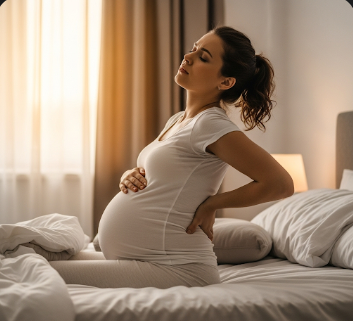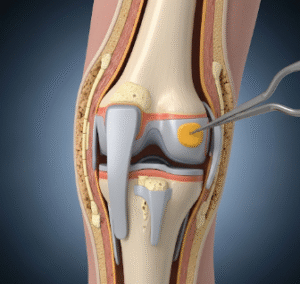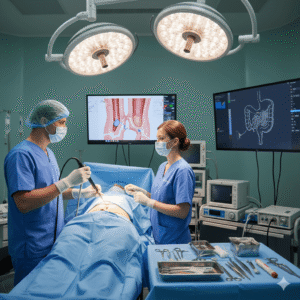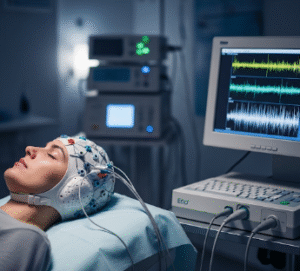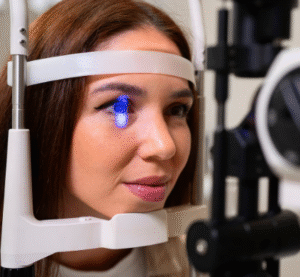Overview
Back pain during pregnancy is a common condition that affects up to 50–70% of expectant mothers, often due to hormonal changes, weight gain, and altered posture. Pain can range from mild discomfort to severe pain affecting daily activities. Typically, lower back and pelvic regions are most affected, though some women experience mid-back pain as well.
In South Korea, maternity hospitals and obstetric clinics provide comprehensive evaluation and management of pregnancy-related back pain, including non-pharmacological strategies, physiotherapy, and safe medical interventions to ensure maternal comfort and fetal safety.
Key Facts
Highlights:
➡️ Back pain can occur at any stage of pregnancy, but is most common during the second and third trimesters.
➡️ Hormonal changes, particularly increased relaxin, loosen ligaments, making joints more flexible and prone to discomfort.
➡️ Postural changes and weight gain shift the center of gravity, increasing strain on the back muscles.
➡️ Risk factors include previous back pain, multiple pregnancies, and physically demanding activities.
➡️ South Korea offers prenatal care programs, physiotherapy, and obstetric support to manage pregnancy-related back pain effectively.
What is Back Pain During Pregnancy?
Back pain during pregnancy is discomfort or pain in the lower, middle, or upper back resulting from physiological and mechanical changes of pregnancy. Common types include:
- Lumbar Pain: Lower back discomfort due to added weight and altered posture.
- Pelvic Girdle Pain: Pain in the hip, sacrum, or pubic area from joint instability.
- Sciatica: Nerve compression causing pain radiating down the legs.
It is typically mechanical rather than inflammatory but can interfere with sleep, mobility, and overall quality of life.
What Symptoms are Related to Back Pain During Pregnancy?
Symptoms vary depending on the affected structures:
- Aching or stiffness in the lower back
- Pain radiating to hips, buttocks, or legs
- Difficulty standing, walking, or changing positions
- Pain worsened by prolonged standing, sitting, or lifting
- Muscle spasms in the back
- Feeling of pelvic instability or pressure
- Sleep disturbances due to discomfort
Highlights:
➡️ Symptoms are often more pronounced in the later stages of pregnancy.
➡️ Pain may fluctuate during the day depending on activity level and posture.
What Causes / Possible Causes of Back Pain During Pregnancy?
Highlights:
➡️ Hormonal Changes: Relaxin and progesterone loosen ligaments and joints, increasing strain on the back.
➡️ Postural Changes: Forward tilt of the pelvis and increased lumbar lordosis due to growing uterus.
➡️ Weight Gain: Additional weight puts mechanical stress on the spine and supporting muscles.
➡️ Muscle Weakness or Imbalance: Weak abdominal or back muscles fail to adequately support the spine.
➡️ Previous Back Problems: History of chronic back pain or spinal disorders may worsen symptoms.
➡️ Fetal Position: Certain positions, such as occiput posterior, can increase pressure on the lower back.
➡️ Stress and Fatigue: Physical and emotional stress can exacerbate perception of pain.
When Should I See My Doctor?
Highlights:
➡️ If back pain is severe, persistent, or accompanied by fever.
➡️ If there is sudden onset of pain or sharp stabbing sensations.
➡️ If pain is associated with vaginal bleeding, contractions, or fluid leakage.
➡️ If numbness, tingling, or weakness occurs in the legs.
➡️ Early assessment ensures there are no complications and allows safe management strategies during pregnancy.
Care and Treatment
Management of back pain during pregnancy focuses on pain relief, posture support, and safe mobility:
Highlights:
➡️ Non-Pharmacological Strategies:
- Prenatal yoga or gentle stretching
- Pelvic tilts and strengthening exercises for back and core
- Use of maternity support belts
- Proper posture and ergonomics while standing, sitting, and sleeping
- Heat or cold therapy applied safely
➡️ Physical Therapy: Tailored programs to strengthen supporting muscles and improve flexibility.
➡️ Safe Medications: Acetaminophen may be recommended for mild pain; NSAIDs are generally avoided.
➡️ Lifestyle Adjustments: Adequate rest, light exercise, and avoiding heavy lifting.
➡️ Complementary Therapies: Prenatal massage, acupuncture, and water therapy under professional supervision.
➡️ Education: Guidance on proper body mechanics, lifting techniques, and exercise routines.
Treatment Options in Korea
South Korea provides specialized prenatal and obstetric care for managing back pain during pregnancy:
Highlights:
➡️ Prenatal Care Clinics: Monitoring maternal and fetal health while addressing musculoskeletal discomfort.
➡️ Physiotherapy Centers: Specialized prenatal exercise programs to reduce back strain.
➡️ Pain Management Services: Safe modalities such as TENS (Transcutaneous Electrical Nerve Stimulation) and manual therapy.
➡️ Obstetric Consultation: Guidance on fetal positioning, delivery planning, and labor preparation.
➡️ Multidisciplinary Care: Collaboration between obstetricians, physiotherapists, and pain specialists.
➡️ Postpartum Support: Rehabilitation for back muscles, posture correction, and recovery from labor-related strain.
➡️ Medical Tourism Support: Multilingual consultations, structured prenatal programs, and follow-up care for international patients.

